Northern Vietnam
Hanoi Captital
Mai Chau
As the starting point on the journey to conquer Ha Giang Loop, Quan Ba welcomes visitors with its unreal natural beauty.
What does this captivating land have in store for you? Let’s find out with Fola Travel.
Located 1000 meters above sea level, nearly 50 kilometers North of Ha Giang City, Quan Ba is where your thrilling nature exploration begins.
Picture the verdant mountains of Quan Ba, cascading into the gentle valleys, dotted with the colorful roofs of local villages. The harmonious picture between Quan Ba’s nature and people creates a fascinating allure.
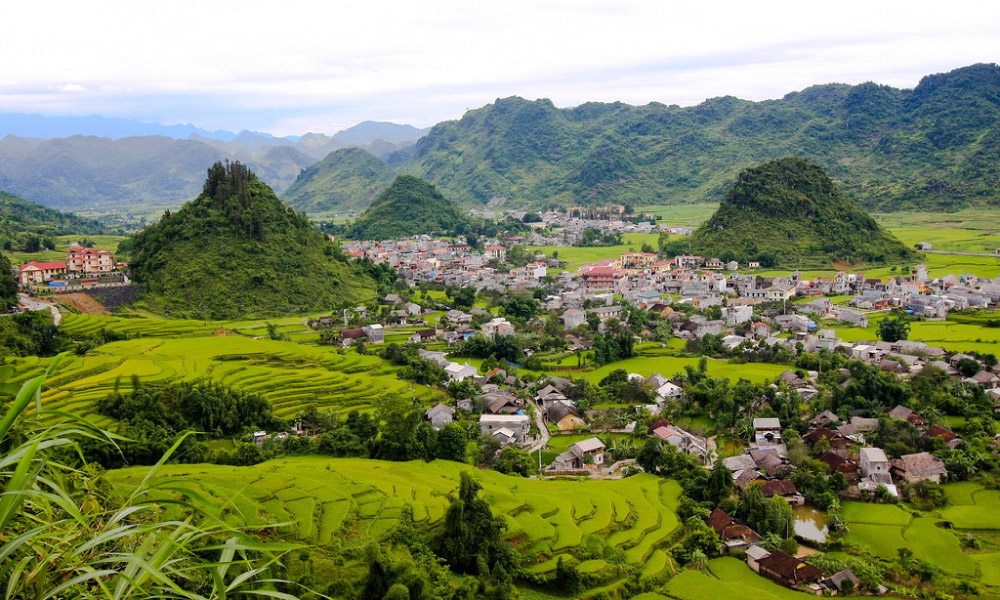
As the gateway to the iconic Dong Van Karst Plateau Geopark and home to wonders like the Twin Mountains and Heaven’s Gate, Quan Ba’s stunning landscapes draw visitors from all corners of the globe year after year.
Home to many minority groups living together, Quan Ba is a living mosaic of ethnic cultures, where diverse traditions harmonize to form a unique identity.
Travelers to Quan Ba can directly experience and learn about these traditions through a range of festivals and folk events. Highlights include the Ethnic Culture, Sports and Tourism Festival, the Thanh Van Commune Cuisine Festival, the Mong’s Brocade Weaving Festival and Gau Tao Festival, the Dao’s Cap Sac Ceremony, and the Tay’s Long Tong Festival.
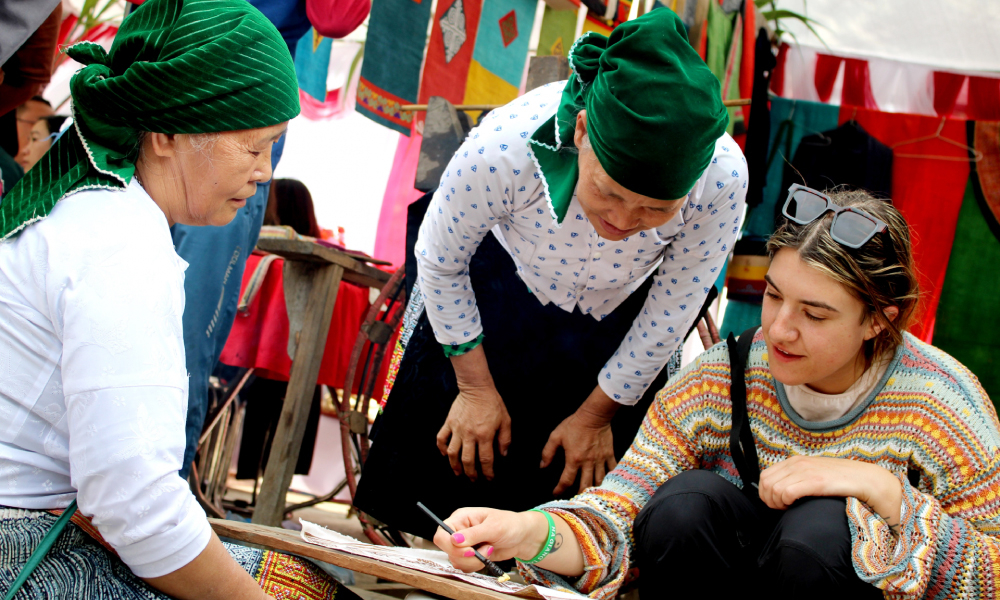
Here, every moment is a chance for you to step into a unique cultural and artistic space, indulging in the authentic tastes of the mountains and forests.
Reaching Quan Ba from Hanoi is an adventure in itself, a journey of approximately 350 kilometers or about 6 hours by motorbike or car. This route, with its challenging steep passes and winding mountain roads, is best suited for experienced and confident travelers who want to experience Ha Giang on their own.
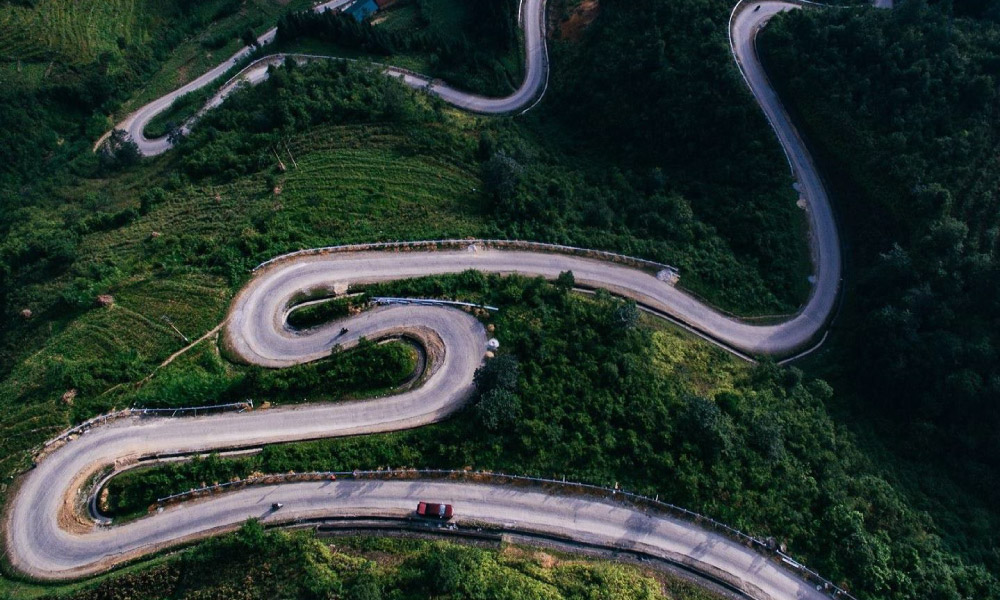
For those prioritizing convenience and safety, opting for a tour package with transportation from Hanoi to Ha Giang is the more popular and safer choice.
Fola Travel offers all-inclusive Ha Giang Loop and cultural exploration tours that take you to gorgeous places like Quan Ba. Our tours cover everything: pick-up and drop-off services in Hanoi city center, meals, and accommodation, all at fantastic prices.
Book your tour with us for a complete, enjoyable, and worry-free trip!
See more: The best Ha Giang tours & packages for 2025!
The beauty of Quan Ba’s nature changes with the seasons, offering unique allure throughout the year.
A highly anticipated period for many visitors is the Quan Ba flower season, from October to December, when the buckwheat flower fields are in full bloom, covering the mountains and hills in a poetic pink and white color. August and September are also great times to visit Quan Ba, with pleasant weather and little fog, providing an optimal view of the picturesque landscapes.

For cultural enthusiasts, plan your trip around the ethnic minority festivals in early spring to experience their vibrant customs and practices!
Quan Ba Heaven’s Gate marks the entrance to the Dong Van Stone Plateau, on the road connecting Ha Giang City with Quan Ba. This famous viewpoint offers an awe-inspiring panorama of Quan Ba’s natural beauty, from the majestic mountains and forests, terraced fields, to the year-round blooming valleys of flowers.
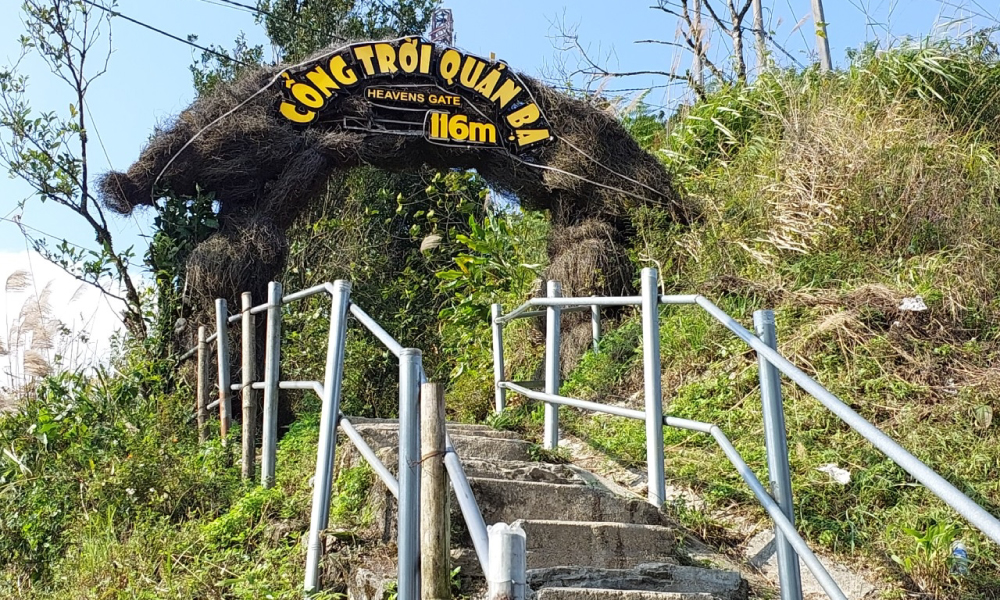
Also known as Fairy Mountains, Quan Ba Twin Mountains have a unique landscape associated with an interesting folklore.
These two perfectly rounded mountains, like two upside-down bowls nestled next to each other, stand out against Quan Ba’s scenery. Over time, Twin Mountains have become an essential destination for Ha Giang visitors, who come to admire their beauty and capture memorable photographs.
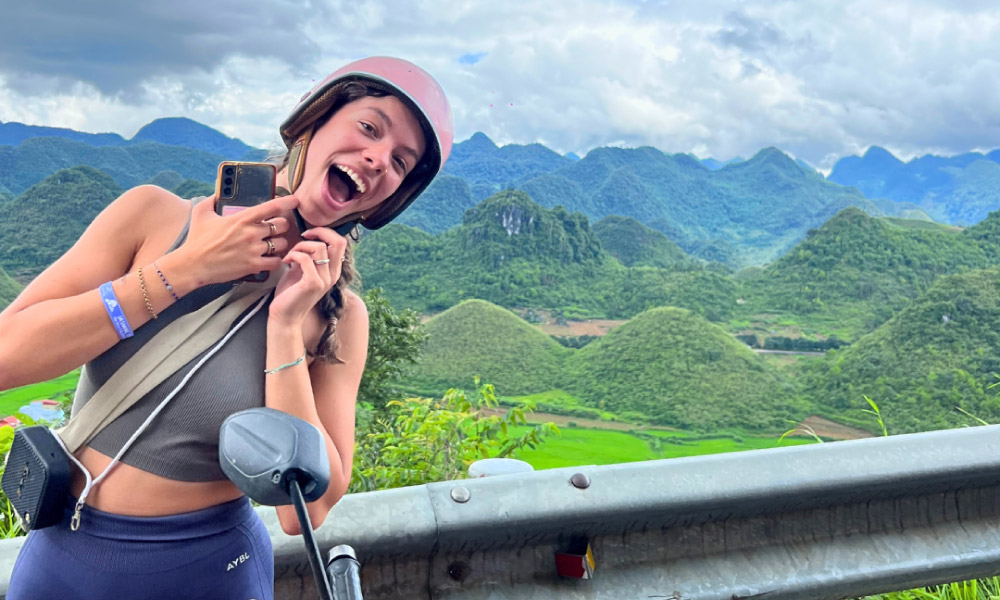
The Twin Mountains are famously tied to a captivating fairy tale: a handsome Mong man, whose musical talents has made a fairy in the sky fall in love with him. Their love blossomed, leading them to settle together in Quan Ba. That is why the twin mountains are also called Fairy Mountains!
Considered the most exquisite cave in Ha Giang, Lung Khuy Cave impresses with its magical and brilliant stalactite system. Discovered only 10 years ago, it’s located halfway up a mountain in Quan Ba commune, roughly 10 kilometers from the district center. The name Lung Khuy Cave was drawn from the Mong village living down at the mountain’s foot.
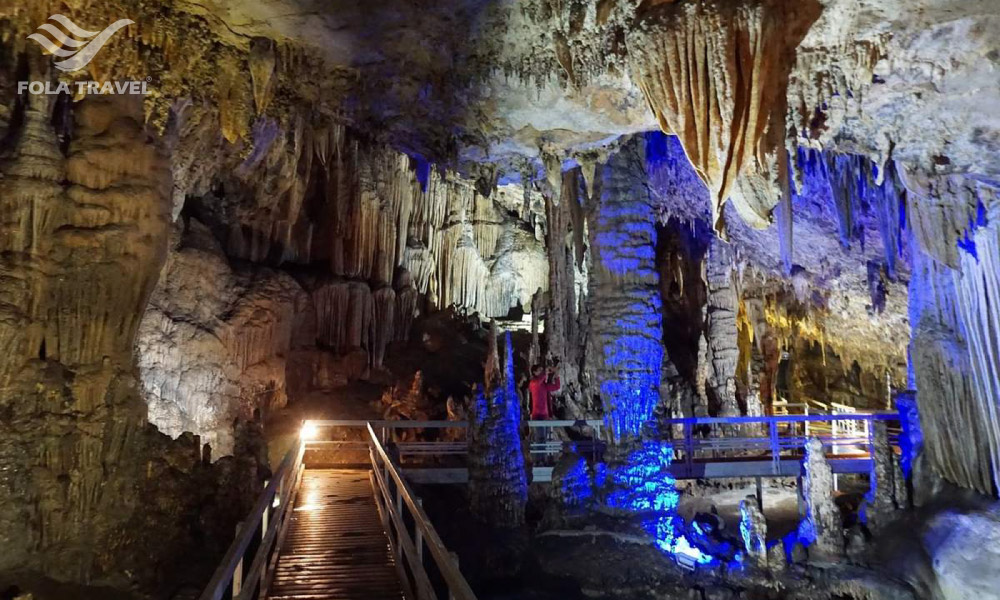
Lung Khuy Cave extends for approximately 1,000 meters, opens up to nearly 200 meters wide in certain areas, and has a fairly high ceiling. Lung Khuy Cave is about 1,000m long with a wide cave, even up to nearly 200m wide in some places, and a fairly high cave ceiling. Exploring inside the cave, visitors can admire a vast system of stalactites in delicate, winding formations that seem like the precise work of a master sculptor.
Discover Nam Dam, a peaceful Dao ethnic village nestled in the Quan Ba valley. The highlight of Nam Dam Village lies in the small stilt houses with their colorful roofs, seen from above like open umbrellas, vividly scattered across the verdant terraced fields.
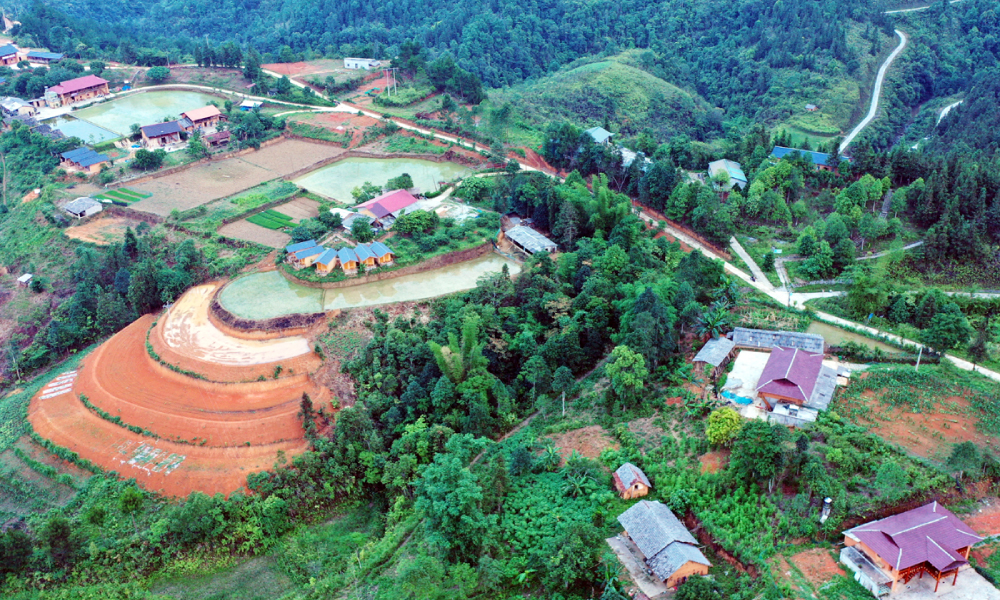
In Nam Dam, visitors can experience a day of local life, enjoy rustic dishes, and participate in engaging cultural exchanges like dancing and campfires.
The bustling Quyet Tien Market in Quan Ba is an interesting destination that you should definitely visit.
Quyet Tien Market is held every Saturday morning before dawn. When mist still covers the mountains, the ethnic people eagerly head to the market to buy, sell, and connect. Visiting Quyet Tien Market, tourists can feel the vibrant, warm, and lively atmosphere of local life.

This is also an ideal spot to find unique local specialties to take home as gifts for your loved ones!
Bat Dai Son, a commune nestled against the Vietnam-China border, is home to the Dao and Mong ethnic groups. This place is associated with the legend of Son Tinh (Mountain Fairy) and Thuy Tinh (Water Fairy), a folklore loved by many generations of Vietnamese people.
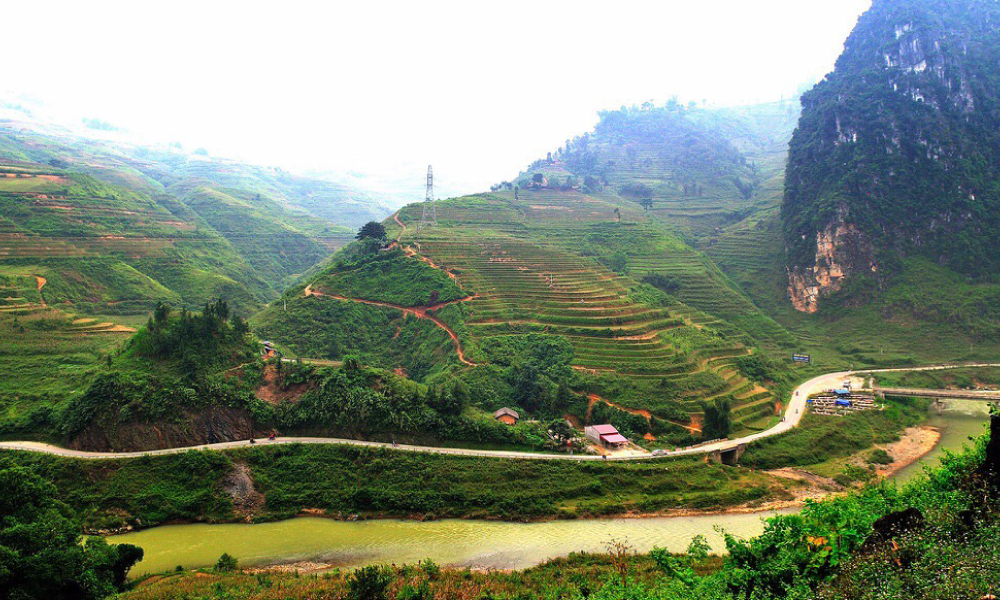
Besides that, Bai Dai Son attracts tourists with the wild and majestic beauty of nature. The landscape here unfolds like a painting: a symphony of green tones from hills and forests, mixed with the azure of the sky and winding rivers.
Visiting Bat Dai Son will make you feel profoundly connected to nature, a small yet significant part of its breathtaking scale.
As one of the most beautiful caves in Ha Giang, Kho My Cave immediately impresses with its magnificent system of stalactites. This cave system is like a self-contained ecosystem, surrounded by a pristine forest that leads up the mountain slopes where Quan Ba residents have built their terraced fields for farming.
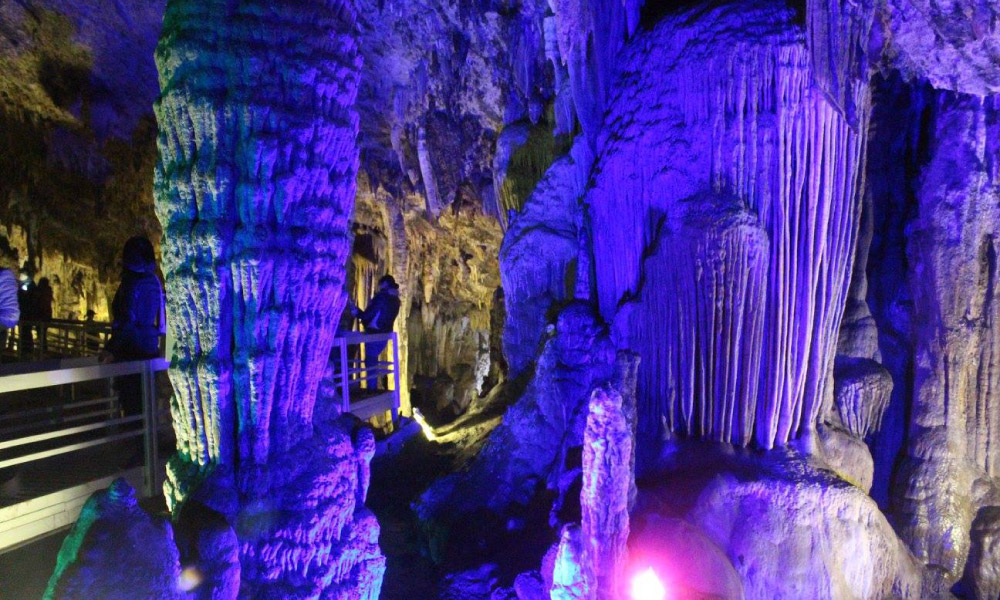
On the Ha Giang Loop from Quan Ba to Yen Minh, a popular stop is the lonely tree in Quan Ba.
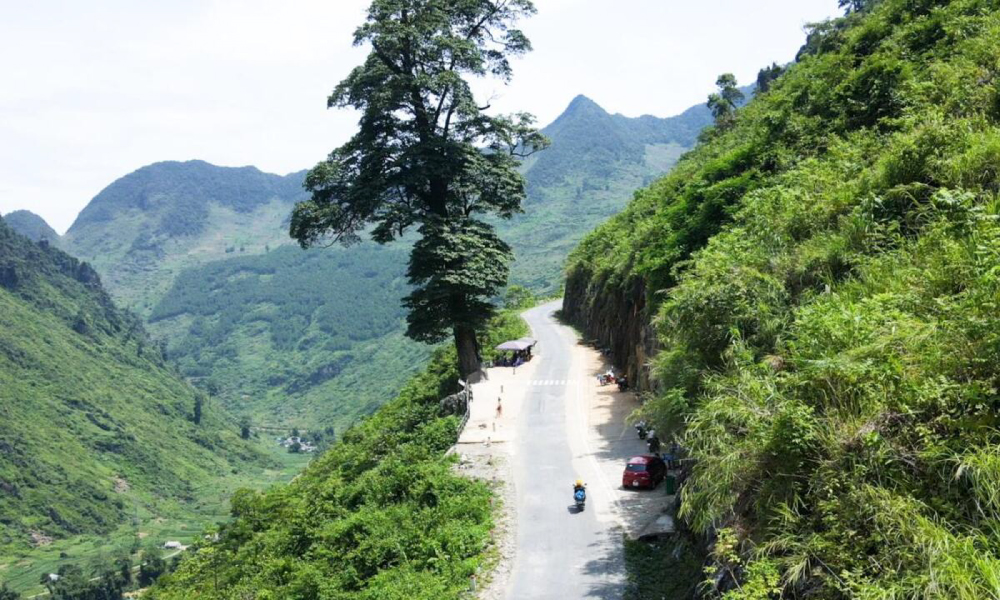
Standing firmly on the edge of a deep abyss, this tree grows straight and strong, its branches lush with leaves, enduring countless winds and storms. No one knows its exact age, but its solitary, unique location alone sparks curiosity and draws many visitors eager to witness it.
As a highland region, Quan Ba has many wonderful specialties that visitors can enjoy, infused with the rich flavor of the mountains and forests. Some famous traditional Ha Giang dishes that you should try are five-color sticky rice, Thang Co (meat soup), Banh Cuon Chan (Rolled Rice Cakes with Soup), etc.
Beyond these delights, Quan Ba is also renowned for its delicious seedless persimmons, along with exquisite brocade products made in local craft villages, which make perfect gifts or souvenirs to remember your trip.
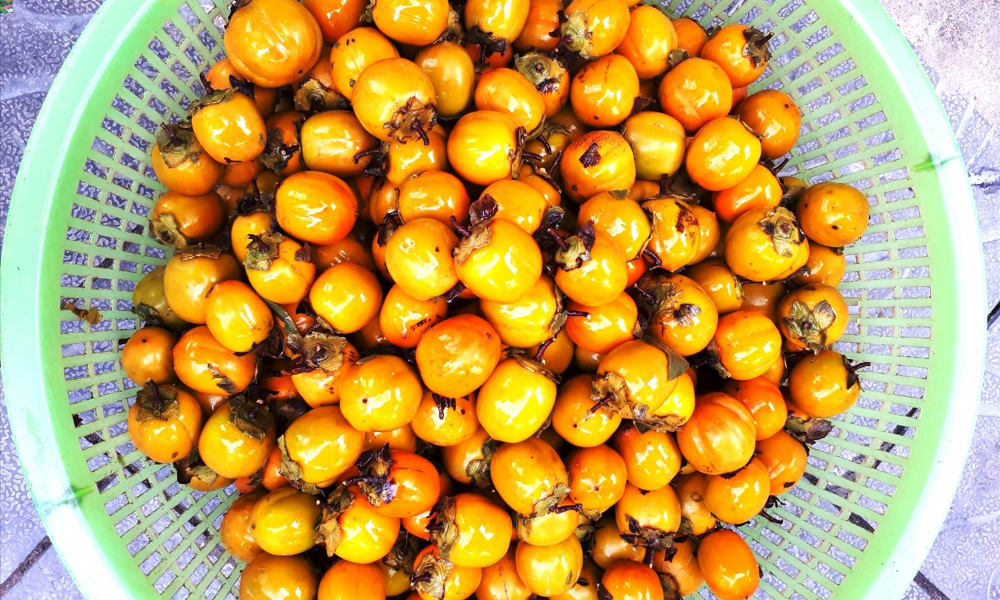
Due to Quan Ba’s mountain roads and potential dirt paths, you should prepare comfortable shoes and sportswear for easy movement. If visiting in winter, remember to bring warm coats, gloves, and scarves as it gets significantly colder than the delta areas like Hanoi.
With tours to Quan Ba and Ha Giang in general, Fola Travel always pays attention to fully preparing necessary supplies, protective gear, as well as medical items for tourists, ensuring a safe and complete trip.
SHARE YOUR OPINION